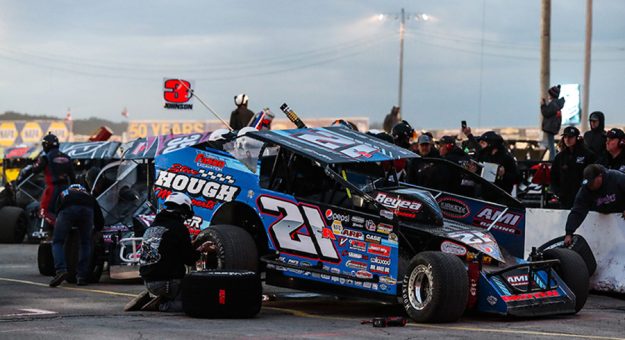OSWEGO, N.Y. — Big block modified drivers will enter the Billy Whittaker Cars 200 at Super DIRT Week with an all-new mindset this year.
A new race day format, announced in July, for the 200-lap race on Sunday, Oct. 8, now provides the chance for a fuel stop on lap 75 and/or 125. The format removes the lap 100 stop and no longer mandates a pit stop.
There will now be a competition yellow — at or around laps 75 and 125 — freezing the lap counter.
Teams will have the option to enter the pit at that time or remain on the track — but these will be the only two times they’re allowed to take fuel. Cars that remain on track will maintain their position. The cars that pitted will have four laps to get work done and will return to the track in the order they pitted — no passes will be made on pit road — lining up behind the cars that opted to not pit.
While completely new to the Super DIRTcar Series big block modified stars, several are seeing the benefits and intrigue it can provide at Oswego Speedway.
“Honestly, I love the idea of no live [fuel] stops and no radios (with the teams),” Super DIRTcar Series driver Chris Hile said. “I think it is going to make the racing better for all of the fans. Radio racing has obviously been in the history for Super DIRTcar Series and whatnot. I think that started to tally off a little bit when we left Syracuse.
“I think being that it’s up in Oswego, it is more of a short track feeling anyway.
“It’s going to be exciting for the fans because you’re not going to know when drivers are coming in. Before it was, we always had a couple of laps to talk to our crew, say what are we going to do. Where now it’s like, crews are going to have to be up on the wall and be ready. Your driver could pull in and all the sudden, it’s like, ‘Here we go.’”
For two-time Billy Whittaker Cars champion Mat Williamson, the new format is also a safer option as crew members will no longer deal with the rush of live fuel stops.
“As a kid, going to Syracuse, I always looked forward to live pit stops, but as I grew older the stuff we see on pit road, I think that it’s the safest option,” Williamson said. “I think as everything transpires; we just need to think about safety. We’re not professionals working on these things. They’re guys with full time jobs. We have to keep that in mind too. I think it is the safest option now.”
It’s also cost effective for teams too as they won’t need a spotter, or as many crew members, and won’t need a quick fill system for the car. Because of that, reigning Super DIRTcar Series Rookie of the Year Anthony Perrego said he thinks more teams will show up.
“Definitely going to throw a curve ball at things,” Perrego said. “But for me, makes it a lot easier. Saves a lot of people from coming. Maybe for their sake you’ll get a lot more cars by not having to put all the equipment and all that in. A lot more people are going to come.”
Jimmy Phelps, who has competed in 19 Billy Whittaker Cars 200 events — finishing fourth last year — said he sees both sides of the new format. While he’s a driver that likes a lot of information and talking with his team during the race, he said there is a downside to it with the potential for blocking and teams copying strategies.
So, with the new format, he said he’s excited to see how it plays out.
“(If the surface is) like we had last year, it’s a dog fight all night long,” Phelps said. “Fuel doesn’t really matter. You do see where tires cycle in and out and that becomes super important. And that’s not going to change. A guy can still take tires on with 50 to go and still be a factor. Or a guy might try to stretch his tires from 75 when he takes on fuel and there might be some excitement and drama there.
“We’ll adjust and probably do a little more scenario planning, leading up to race day so we’re all on the same page of the what if type of thing. Let’s be ready to do this, this and this. Just a little bit more pre-prep, that’s all.”
There will be more pressure on the driver to make the pit call during race, but Hile said he believes drivers and teams will still find creative ways of communicating.
“Before, it was a culmination of everybody saying, ‘Where are we? ‘How are we doing? Now it’s more or less in the driver’s hands,” Hile said. “I’m sure there will be white pit boards and things like that where people will be writing on stuff. A lot of the drivers probably won’t have to make that decision on their own. I think there will still be ways to have lines of communication.
“Obviously, we won’t be able to talk back and forth but if you see a white board that says, Lap 85, time to come in, then that’s when you come in. We’re excited for it. Just, it really levels the playing field off for everybody. I think it is going to be a great show for the fans for sure.”
